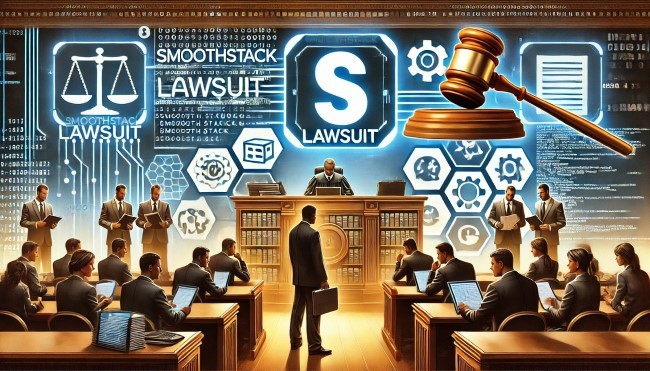Smoothstack Lawsuit: A Turning Point in Tech Employment Practices
Examining the Impact and Legal Ramifications of the Smoothstack Lawsuit

The Smoothstack lawsuit has brought to light significant concerns regarding labor practices within the tech training industry. This class-action case, initiated in April 2023, addresses allegations of unfair labor conditions, wage theft, and the controversial use of Training Repayment Agreement Provisions (TRAPs), which impose steep penalties on employees who leave the company prematurely.
Introduction to the Smoothstack Lawsuit
The lawsuit against Smoothstack Inc., a tech staffing and training company, has raised crucial questions about the treatment of employees within the tech industry. Filed by former employee Justin O’Brien, the case highlights the struggles faced by tech workers subjected to unpaid labor and restrictive contractual agreements. The lawsuit aims to challenge these practices and seek justice for the affected employees.
Background of Smoothstack and Its Business Model
Smoothstack positions itself as a premier tech staffing agency, providing intensive training programs for aspiring IT professionals. However, the company’s business model has come under scrutiny due to allegations that its training programs involve excessive unpaid labor and onerous repayment agreements. These TRAPs, which mandate that employees repay training costs if they leave the company before completing a set number of billable hours, have sparked widespread controversy and legal challenges.
Key Allegations in the Smoothstack Lawsuit
The core allegations of the lawsuit revolve around the following points:
Unpaid Wages and Overwork
Plaintiffs claim that Smoothstack’s training program requires trainees to work up to 80 hours per week, yet compensates them for only 40 hours. Additionally, the company allegedly fails to pay trainees for the first three weeks of the program, resulting in significant wage theft.
Training Repayment Agreement Provisions (TRAPs)
TRAPs are at the heart of the lawsuit. These agreements force employees to repay up to $24,000 if they leave the company before completing 4,000 hours of billable work. This clause effectively traps employees in their positions, limiting their career mobility and financial freedom.
Retaliation and Unfair Treatment
The lawsuit also includes allegations of retaliation against employees who raise concerns about the company’s practices. Justin O’Brien, the lead plaintiff, claims he faced adverse actions from Smoothstack after voicing his grievances.
Legal Context and Precedents
The Smoothstack lawsuit is not an isolated case. Similar lawsuits have been filed against other companies, challenging the legality and fairness of TRAPs and other restrictive employment practices. The outcome of this lawsuit could set significant legal precedents and influence future labor practices in the tech industry.
The Impact on Workers
Financial Hardships
Many employees have reported financial difficulties due to unpaid wages and the penalties imposed by TRAPs. These financial strains, coupled with long working hours, have taken a toll on the well-being of workers.
Emotional and Psychological Stress
Beyond financial hardships, the lawsuit has highlighted the emotional and psychological impact on workers. The stress of dealing with unfair labor practices and the uncertainty of legal proceedings has affected many employees’ mental health.
Broader Implications for the Tech Industry
The Smoothstack lawsuit has far-reaching implications for the tech industry as a whole. It has prompted a broader conversation about fair labor practices and the ethical treatment of employees in tech training programs.
Potential Changes in Employment Contracts
One potential outcome of the lawsuit is a reevaluation of employment contracts within the tech industry. Companies may be forced to revise their contractual agreements to ensure they are fair and transparent.
Increased Regulatory Scrutiny
The case has also drawn attention from regulatory bodies, which may lead to stricter oversight and enforcement of labor laws in the tech sector. This increased scrutiny could result in better protections for workers and more equitable employment practices.
Expert Opinions on the Smoothstack Lawsuit
Legal experts and labor advocates have weighed in on the implications of the Smoothstack lawsuit. Many argue that TRAPs should be banned or heavily regulated to prevent exploitation and ensure fair treatment of employees.
Calls for Policy Changes
There have been calls for policy changes at both the state and federal levels to address the issues raised by the Smoothstack lawsuit. These changes could include new regulations governing training programs and employment contracts in the tech industry.
Conclusion: A Turning Point for Worker Rights in Tech
The Smoothstack lawsuit represents a critical moment for worker rights in the tech industry. As the case progresses, it has the potential to bring about significant changes in how tech companies operate and treat their employees. The outcome could set important legal precedents and inspire broader reforms, ensuring a fairer and more equitable workplace for tech professionals.
Future Outlook and Recommendations
For Employees
Tech workers should be vigilant about the terms of their employment contracts and seek legal advice if they encounter unfair practices. Understanding one’s rights and advocating for fair treatment is crucial in navigating the complexities of the tech industry.
For Employers
Companies should prioritize transparency and fairness in their employment practices. By fostering a supportive and equitable work environment, they can attract and retain top talent while avoiding legal challenges and reputational damage.
For Policy Makers
Policymakers should consider the implications of the Smoothstack lawsuit and work towards creating robust regulations that protect workers’ rights and promote fair labor practices in the tech industry.
The Smoothstack lawsuit is more than just a legal battle; it is a catalyst for change in the tech industry. By addressing the issues of unpaid wages, restrictive contracts, and unfair treatment, this case has the potential to reshape the landscape of tech employment and set a precedent for fair and ethical labor practices.



